|
Black Sun: The Nanking Massacre
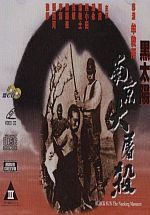
AKA: Men Behind the Sun 4, Men Behind the Sun IV, Man Behind the Sun 4, Man Behind the Sun IV, Black Sun: Nanking Massacre
Year of release: 1995
Genre: war drama
Director: Mau Dui-Fai
Producer: Mau Dui-Fai
Writer: Lee Wing-Shui
Cinematography: Sung Kin-Man
Music: Ngau Cheong-Kwan
Stars: Cheung Leung, Poon Wing, Hung Siu-Tin, Geung Man-Ting, Siu Wa, Poon Man-Diy, Hon Jan Wa, Lee Wai, Cheung Sai-Hiu, Tsui Ching
Rated III for violence, language, and brief nudity
Movie review index
Main page
|
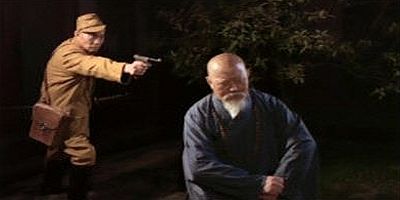 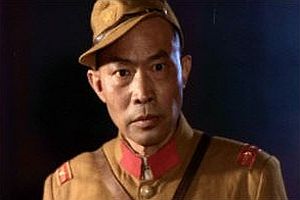
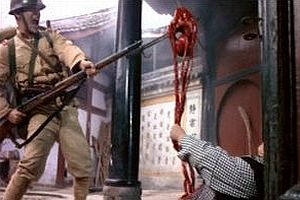 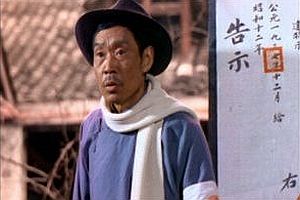
|
By Hong Kong standards, director Mau Dui-Fai (aka T.F. Mous) has not been very prolific, with only about a dozen films to his credit since starting his career in 1977. But many of his releases have attracted their fair share of controversy due to their high levels of sex and/or violence, most notably his 1988 war drama Men Behind the Sun, which was extremely graphic and the first film to receive Hong Kong's Category III (their version of NC-17) rating.
Though Mau's 1995 picture Black Sun: The Nanking Massacre (sometimes labeled as Men Behind the Sun 4) isn't quite as hardcore in the violence department, it's still one of the most uncomfortably and unrelentingly grim and desolate movies you're ever likely to see -- but it's still worth taking a look at if you have a strong stomach and a tolerance for the darker side of Hong Kong cinema.
As you can probably infer from the title, Black Sun tells the story of the "massacre of Nanking", which is also referred to as the "rape of Nanking". After Japanese troops took control of the Chinese capitol in December 1937, they went on a rampage. While the exact facts and figures are still unclear, the amount of devastation inflicted has rarely been matched in history, with some historians theorizing that nearly 300,000 Chinese soldiers and civilians were killed in a matter of weeks. Those that lived did not fare much better under Japanese rule, where actions like kidnapping women and placing them in "comfort stations" became the order of the day.
Unlike the recently released City of Life and Death, there is no attempt to humanize the thoughts and methods of the Japanese here. Even the more sympathetic (a relative term in a movie like this) Japanese characters still view the Chinese populace as pieces of meat that must be molded to fit under Japanese rule or just outright killed in the quickest and most "efficient" ways possible. This results in Black Sun having a very one-sided story. But in an instance like this, perhaps one can understand why Mau Dui-Fai wasn't too interested in portraying the Japanese in any sort of favorable light.
Black Sun does have a loose narrative concerning a family trying to save themselves from the wrath of the Japanese, but for the most part, the film can be seen as a series of vignettes that concentrate on specific methods the Japanese used and the times when they carried them out. The scenes are bracketed by actual footage from both Chinese and Japanese sources, which gives the movie even more of an eerie feeling, especially when Mau goes as far as to directly re-create the atrocities captured in those archives.
Mau's liberal use of gore has caused some to label this as an exploitation film, a designation that has not been helped by the salacious cover art used on some home video releases. Yes, Black Sun is a movie that is not for the weak of heart, as it features elements like a fetus being ripped from the womb of a pregnant woman via a bayonet, as well as a monk forced to rape a woman and then castrated. However, at least in this reviewer's opinion, despite the graphic nature of scenes like this, Mau strikes the elusive balance of being able to jolt the audience without pandering to their lowest common denominator.
Unfortunately, Mau's virtuosity with the outpourings of blood doesn't translate to the production as a whole. The acting is workmanlike at best, and even surprisingly wooden at times, given the shocking nature of the proceedings. Also, the camerawork and editing is sub-par. I'm not sure if Mau was going for a cinema verite vibe, but the sloppy nature of the filming style threatens to undercut the tension laid before the viewer. Overall, though, Black Sun is one of the more unique Hong Kong cinematic experiences put out over the past couple of decades, and will remain with you long after the last frame flickers out.
RATING: 7.5
|
|




